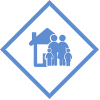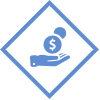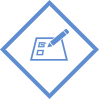Whether you’re a first-time buyer or an experienced investor, we have mortgage solutions to help you achieve your investment and rental property goals.
Benefits of Investment Properties
Investing in rental properties can have numerous benefits. Here are some you can look forward to:

Cash flow
Rental income from investment properties can provide a steady stream of cash flow. In many cases, tenant rent can cover mortgage payments, property taxes, and other expenses. This avenue can open the door for greater flexibility and freedom in your financial life.

Appreciation
In most cases, real estate appreciates in value over time. This means that if you hold onto an investment property for an extended period, you can benefit from this growing value and potentially sell the property for a profit in the future.

Tax benefits
In Canada, there are several tax deductions available to real estate investors earning rental income. These deductions can include mortgage interest, property taxes, insurance premiums, and maintenance expenses.

Control
Unlike other assets, such as stocks or mutual funds, you can make decisions that directly impact the value of your investment property, like renovations or upgrades.
Choosing Your Investment Strategy
Real estate investing can be a great way to create a stream of passive income and grow your wealth over time. However, it’s crucial to carefully choose an investment strategy that aligns with your financial goals. Here are some popular options to consider:
- Buy and hold: One investment strategy is to purchase a property and hold onto it for a prolonged period, usually ranging from 5 to 10 years or more. Throughout this time, you can accumulate rental income and build equity in the property. The aim is to sell the property for a profit once it has increased in value or maintain a long-term stream of passive income by continuing to collect rental payments.
- Fix and flip: This strategy involves purchasing a property that needs significant repairs or renovations, making the necessary improvements, and selling within a relatively short period, like six to 12 months. This can be risker than the buy and hold strategy, as it requires a higher level of expertise and market knowledge to identify properties that have the potential to appreciate quickly.
- Buy, Rehab, Rent, Refinance (BRRR): This involves purchasing a property that needs repairs, renting it out to generate income, refinancing it to pull out the equity, and repeating the process to acquire additional properties. This is a great way to build a property investment portfolio over time.
Types of Mortgage Options
When it comes to your investment property mortgage in Canada, there are different options available to investors: Residential, commercial, and CMHC-insured. Qualifying for a rental property mortgage depends on factors such as:
- The type of property
- The number of units
- The purchase price
- The down payment
- Whether or not you live in one of the units
1. Residential Mortgages
Residential mortgages are designed for investors who want to purchase residential properties such as single-family homes, townhouses, condos, and multi-unit residential buildings with four units or fewer. The qualification requirements and down payment for these types of mortgages depend on the specific number of units and whether you live in one of them (non-owner vs. owner-occupied):
- Non-owner-occupied: Lenders usually require a higher down payment of 20% if you don’t intend to live in one of the units.
- Owner-occupied: You may be eligible for better interest rates and a lower down payment of 5% to 10% if you live in one unit for at least a year. This criterion may make you eligible for the next mortgage on the list: CMHC-Insured.
2. CMHC-Insured Mortgages
This is a type of owner-occupied rental residential mortgage designed to help you purchase rental properties of four units or less with a down payment of less than 20% of the purchase price. It is insured by the Canada Mortgage and Housing Corporation (CMHC) or other insurance providers to protect the lender in case of default. In order to qualify for a CMHC-insured mortgage, you need to meet the following criteria:
- The rental property must be four units or less
- The purchase price must be below $1 million
- You must live in one of the units (owner-occupied)
3. Mult-Residential Financing
A mortgage for a rental property with five or more units would fall under the commercial category. The qualification process for these types of mortgages is often more complex, and getting approval can be more difficult. Generally, commercial mortgages have the highest interest rates of the three options and require a minimum 20% down payment because of the higher risks associated with these types of properties, like tenant turnover or other building-specific issues. However, some specialty multi-residential insured mortgages with CMHC allow you to put down less than 20% without having to occupy one of the units. Keep in mind that this option still only applies to properties with five units or more.
4. Alternative or Private Mortgages
Borrowers can also opt for alternative or private mortgages for their rental properties, especially when they intend on renovating or flipping. Those who use the “Buy, Rehab, Rent, Refinance, Repeat” (BRRRR) strategy often find that getting a private mortgage and then refinancing with a best-rate lender down the road can offer optimal financial security and return on investment.
Frequently Asked Questions
Yes, you can get an investment property mortgage in Canada. Lenders will typically evaluate the property’s income potential, your creditworthiness as the borrower, and your ability to repay the loan.
Yes, rental income can be considered income for a mortgage application in Ontario if it meets specific criteria. Lenders typically look at the net rental income after deducting expenses like property taxes, insurance, and maintenance costs.
The First-Time Home Buyer Incentive program in Canada can apply to a rental property if it is an owner-occupied rental (you live in one of the units year-round) and does not exceed four units.
The minimum down payment required for an investment property depends on the purchase price and the number of units. Typically, the minimum down payment is 20% of the purchase price but can be lowered to 5% to 10% if you meet the specific criteria outlined above.
A Mortgage Solution to Meet Your Needs
We understand that every real estate investor has unique financing needs. That’s why we offer a range of mortgage solutions to meet your specific requirements. Our team of experienced mortgage brokers can help you find the right rental property mortgage, whether you’re purchasing a single-family home or a multi-unit building. Contact us today for more information.

